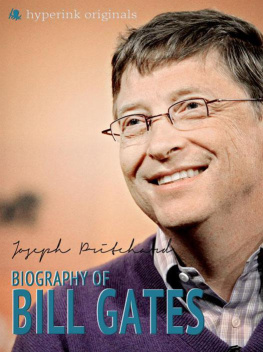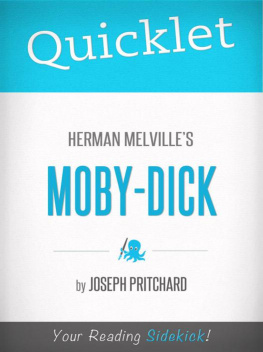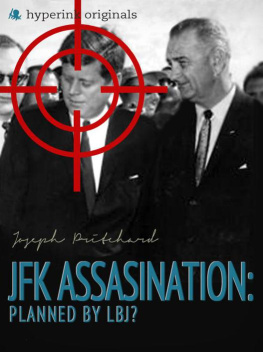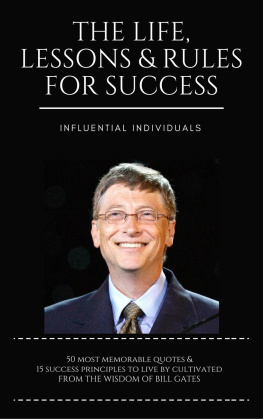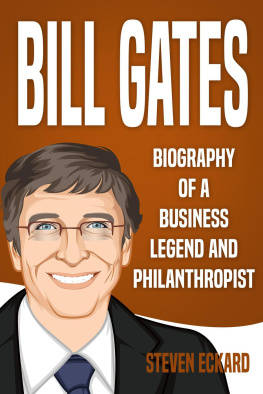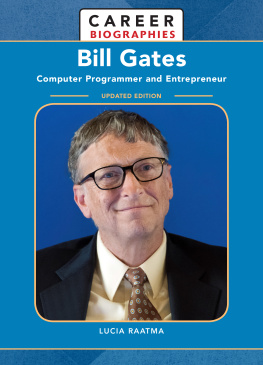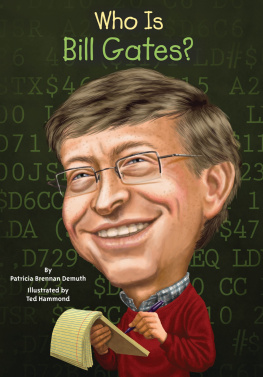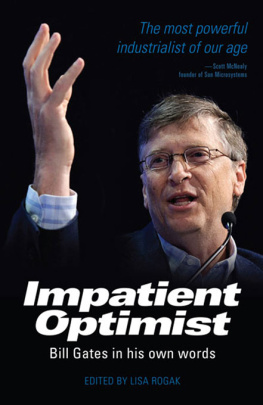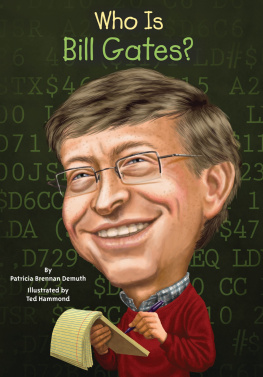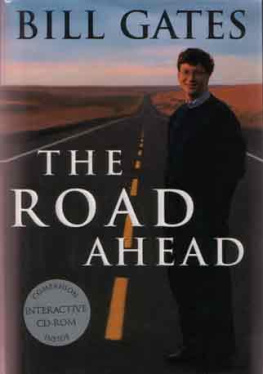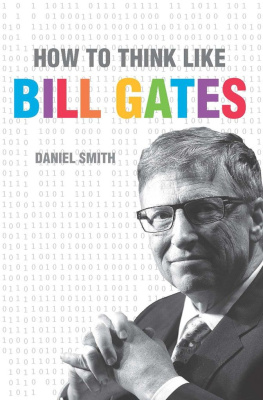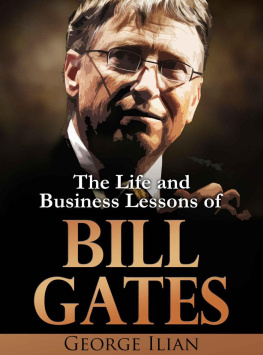Bill Gates: A Biography
I.
Bill Gates: A Biography
Introduction
Visionary , entrepreneur , philanthropist , are some of the words that come to mind when we think of Bill Gates. Gates is undoubtedly one of the most influential technological titans of the 20th and 21st century. Although initially known as the forward-thinking genius behind Microsofts rise to dominance, Gates has since proven himself to be just as savvy in his humanitarian endeavors as he is in business matters.
Through his Bill and Melinda Gates Foundation , Gates has managed to further the a number of humanitarian programs aimed at improving the overall quality of life for those in the developing world. Of course, it would be both disingenuous and naive to characterize Gates through such rose-colored lenses. After all, Gates was no stranger to controversy. It was under his leadership that his company, Microsoft, faced a string of investigations in the 1990s .
Part of the reason for the harsh criticism leveled against Gates largely stemmed from his financial success. Much of the lawsuits he was fighting off were filed by companies that alleged a Microsoft monopoly in the industry. A sentiment that was only bolstered by Gates business philosophy. Moreover, Microsofts business strategy seemed largely bent on acquisition and aggressive business tactics.
But then again, it is difficult to imagine him doing it any other way. This all-consuming competitive drive was something that would dominate much of Gates business life. In fact, this negative perception of Gates became the basis for a 2001 blockbuster, Hollywood thriller called Antitrust , starring Tim Robbins as the films main antagonist . The film was obviously fiction, and contained narrative elements that were largely distorted to suit the films overall plot.
Yet, despite what critics might think, Gates hardly fits the stereotype of the ruthless, greed-driven businessman. Moreover, when this is considered alongside all of the other myths that have obfuscated Gates throughout the years, is it any wonder that understanding him requires a fair bit of demystification?
This begs the certain questions. What events in his life helped shape his views and influence his actions? Who were the significant people in his life? What were the major turning points in Gates life? Understanding the answers to these questions helps place Gates in context.
Context is everything. Human beings are complex and intricately nuanced. While there could doubtless be a myriad reasons behind a persons actions, aspirations and beliefs, it is possible to learn the events, and, albeit to a limited degree, the circumstances surrounding them. So by placing Gates in historical context and understanding significant moments of his life it might be possible to glean some insight into the man behind the myth.
Now, in order to separate Gates the human being, from Gates the techno-titan turned philanthropist, it is necessary to delve into his early life. Doubtless Gates accomplishments and accolades also merit mention. But his personal life as well as his current circumstances all help glean a far clearer understanding of one of the movers and shakers of the current century.
Background and Early Life
William Gates III was born in Seattle, Washington, on the 28th of October 1955 . He was the second child of William Henry Gates, Jr., a successful lawyer, and Mary Maxwell, a former school teacher. His older sister, Kristi, eventually became his tax accountant. While his younger sister, Libby, currently resides in Seattle.
The young Gates had a relatively normal childhood. He participated in sports and even joined the Cub scouts. Although his parents hoped to groom him for a career in law, Gates eventually developed an interest in computer programming at the age of 13 while he was at Lakeside School . At this time a Seattle computer companys involvement with Gates school gave him the opportunity to work with a teletype terminal. Although the machines capabilities pale in comparison with todays computers, the young Gates was enamored by the teletype terminals potential.
Unsurprisingly, Gates s pent much of his free time working on this early computer . He wrote his first program, a tic-tac-toe program, in BASIC at this time. It was also during this time that Gates would meet and become friends with future Microsoft co-founder, Paul Allen.
Although two years ahead of Gates, Allen shared his younger friends passion for computers. What is interesting to note is that the seeds of the eventual rift between Gates and Allen seemed to already exist during this early stage in their relationship. Both boys would spend much of their free time discussing computer programming, as well as even having heated debates over opposing views. Nevertheless, despite the tumultuous patches, they developed a close friendship, such that they would go into business together by the time Gates was 15.
This partnership would allow them to develop a computer program called Traf-o-Data which monitored traffic patterns in Seattle. The program netted the dynamic duo a cool $20,000, which in 1970 was a lot of money. Buoyed by their success, Gates and Allen wanted to use their earnings to start their own company. Unfortunately, Gates parents wanted him to finish his schooling first. After all, they had still hoped to make a lawyer out of their son. Gates finished high school in 1973, and went on to Harvard in the fall of that same year. At the time, he had every intention of pursuing a law degree.
It is interesting to consider that had Gates parents been successful, then perhaps computer technology might not have developed the way it did thanks in no small part to Gates contributions. That aside, it is worth mentioning that Gates maintained contact with Allen throughout this time. It was precisely because of this continued contact that Gates eventually dropped out of Harvard in 1975, much to his parents chagrin.
One year prior to Gates eventual dropping out, he and Allen read about a mini-computer kit called the Altair 8800 which was manufactured by a small, Albuquerque based company called Micro Instrumentation Telemetry Systems, or MITS. The boys contacted MITS, asking if the company was interested in software they were developing that could run the computer. When the president of the company asked for a demonstration, Gates and Allen spent the next two months writing the software at Harvards computer lab. Allen brought the completed program to Albuquerque for demonstration which went smoothly. What is impressive about this feat is that he and Allen managed to do this without access to an Altair.
This eventually led to Allen and Gates forming the company that would eventually be called Microsoft. The companys original name being a hyphenated portmanteau of microcomputer and software. The hyphen was eventually dropped less than a year after the companys founding. The intricacies of Microsofts nomenclature aside, what is fascinating about its early years is how they helped form Gates staunch stance against piracy.
During this time, Microsofts BASIC software for the Altair was earning revenue, the amount was insufficient to cover their overhead. Gates and Allen soon discovered that although their program was hugely popular among computer enthusiasts at the time, about 90 percent of the ones using it had not actually paid for it. In other words, they were really earning about 10 percent of what they should have been earning, and lost the rest to piracy.
Perhaps even more interesting is the difference in perspective between Gates and these computer enthusiasts. The latter saw nothing intrinsically wrong with sharing the program with their friends because it helped spread its use and possibly even helped it gain popularity. Gates, on the other hand, saw this as akin to stealing intellectual property. More to the point, Gates felt that such a practice was ultimately counterproductive as it would give software developers little incentive to produce quality software. He even went so far as to articulate his thoughts in an open letter to computer enthusiasts in 1976.

